

Color, 1984, 94 mins. 16 secs.
Directed by Lucio Fulci
Starring Jared Martin, Fred Williamson, Howard Ross, Al Cliver, Eleonora Brigliadori, Donald O'Brien, Claudio Cassinelli, Hal Yamanouchi
Severin Films (Blu-ray) (US RA HD) / WS (1.85:1) (16:9), Troma (DVD) (US R0 NTSC)
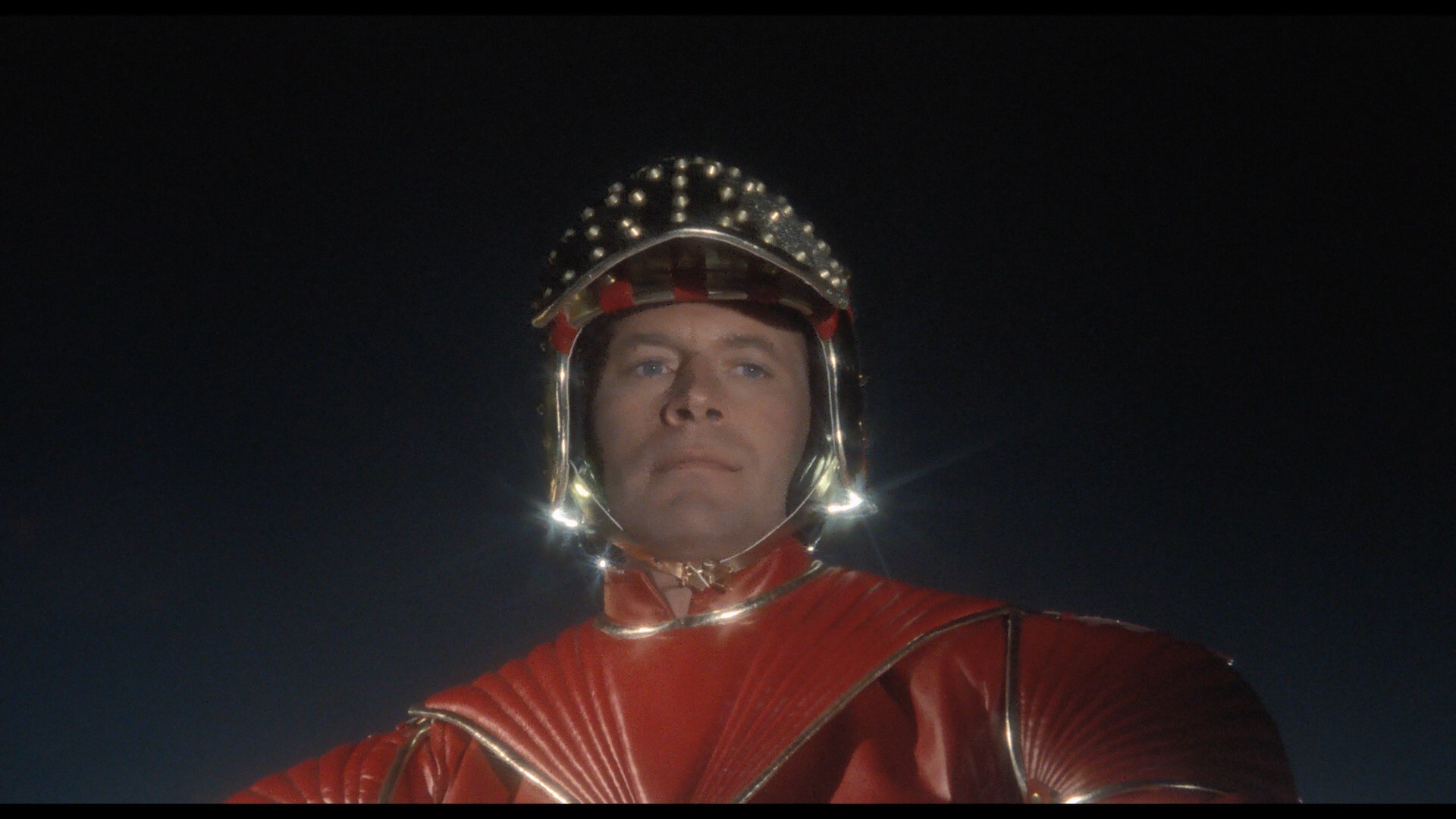 whole Italian post-apocalyptic wave that ignited in the
whole Italian post-apocalyptic wave that ignited in the 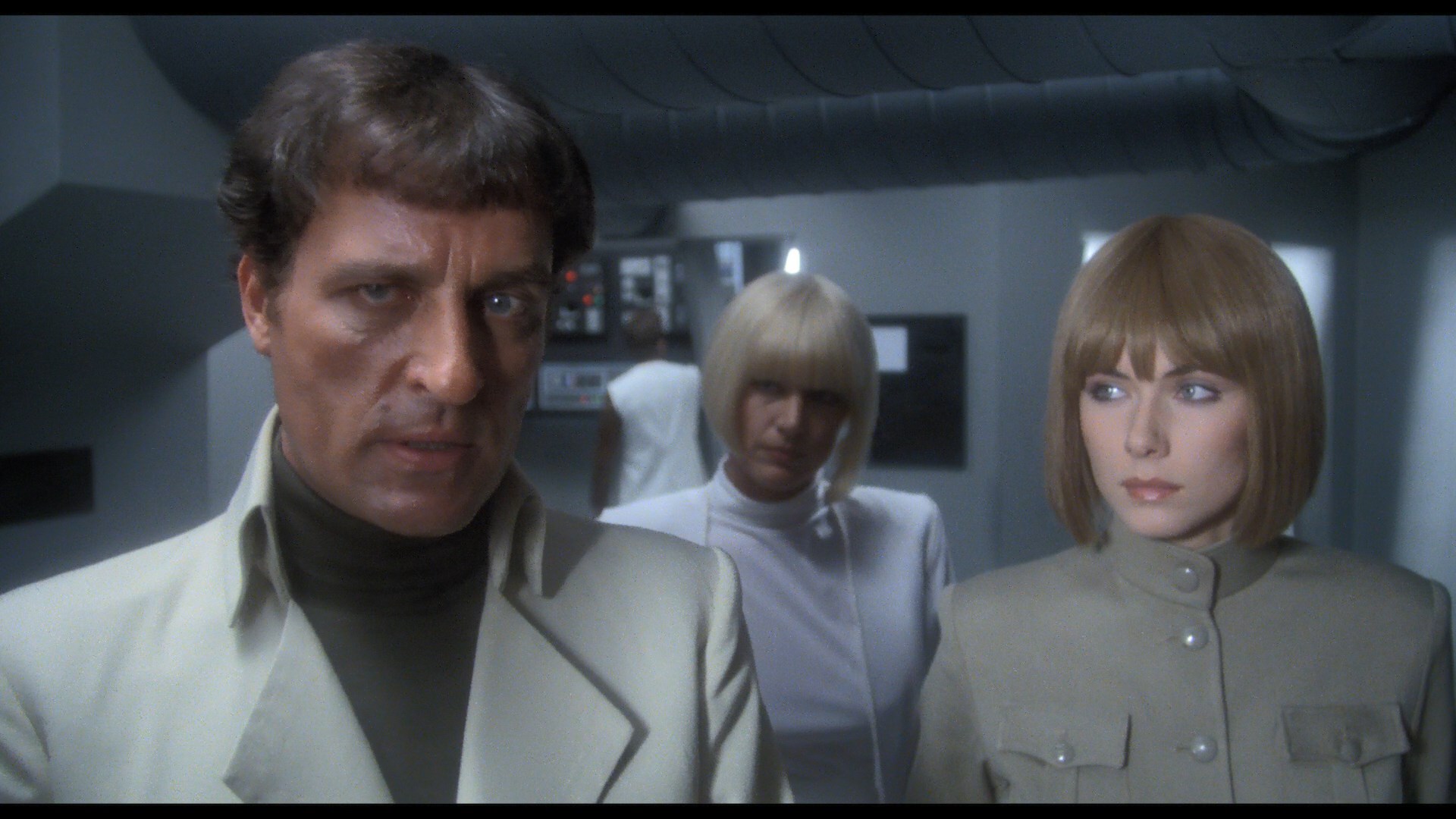 wake of The Road Warrior was quickly fading by the time Lucio Fulci took a stab at it with I guerrieri dell'anno 2072, a futuristic look at Rome's return to gladiatorial combat in the media age. Though set in 2072, the film was also promoted as Rome 2033: The Fighter Centurions (a name even kept on one of its trailers) and ended up hitting American VHS later in the '80s from Media as The New Gladiators, a title retained later in 2001 when Troma released a truly miserable-looking DVD. This would be Fulci's first feature since the mid-'70s with no U.S. theatrical release at all, which was surprising given the ambition and scope of the film itself as well as its plentiful sci-fi violence. As many would later note, its satirical death game show conceit predates the release of 1987's The Running Man (though not its source novel), with more than a few elements of Rollerball tossed in to boot. Regardless, it's still a Fulci film to the core complete with sparkly miniatures, grisly violence, and a jaded view of society clearly evolved from his misanthropic earlier horror
wake of The Road Warrior was quickly fading by the time Lucio Fulci took a stab at it with I guerrieri dell'anno 2072, a futuristic look at Rome's return to gladiatorial combat in the media age. Though set in 2072, the film was also promoted as Rome 2033: The Fighter Centurions (a name even kept on one of its trailers) and ended up hitting American VHS later in the '80s from Media as The New Gladiators, a title retained later in 2001 when Troma released a truly miserable-looking DVD. This would be Fulci's first feature since the mid-'70s with no U.S. theatrical release at all, which was surprising given the ambition and scope of the film itself as well as its plentiful sci-fi violence. As many would later note, its satirical death game show conceit predates the release of 1987's The Running Man (though not its source novel), with more than a few elements of Rollerball tossed in to boot. Regardless, it's still a Fulci film to the core complete with sparkly miniatures, grisly violence, and a jaded view of society clearly evolved from his misanthropic earlier horror 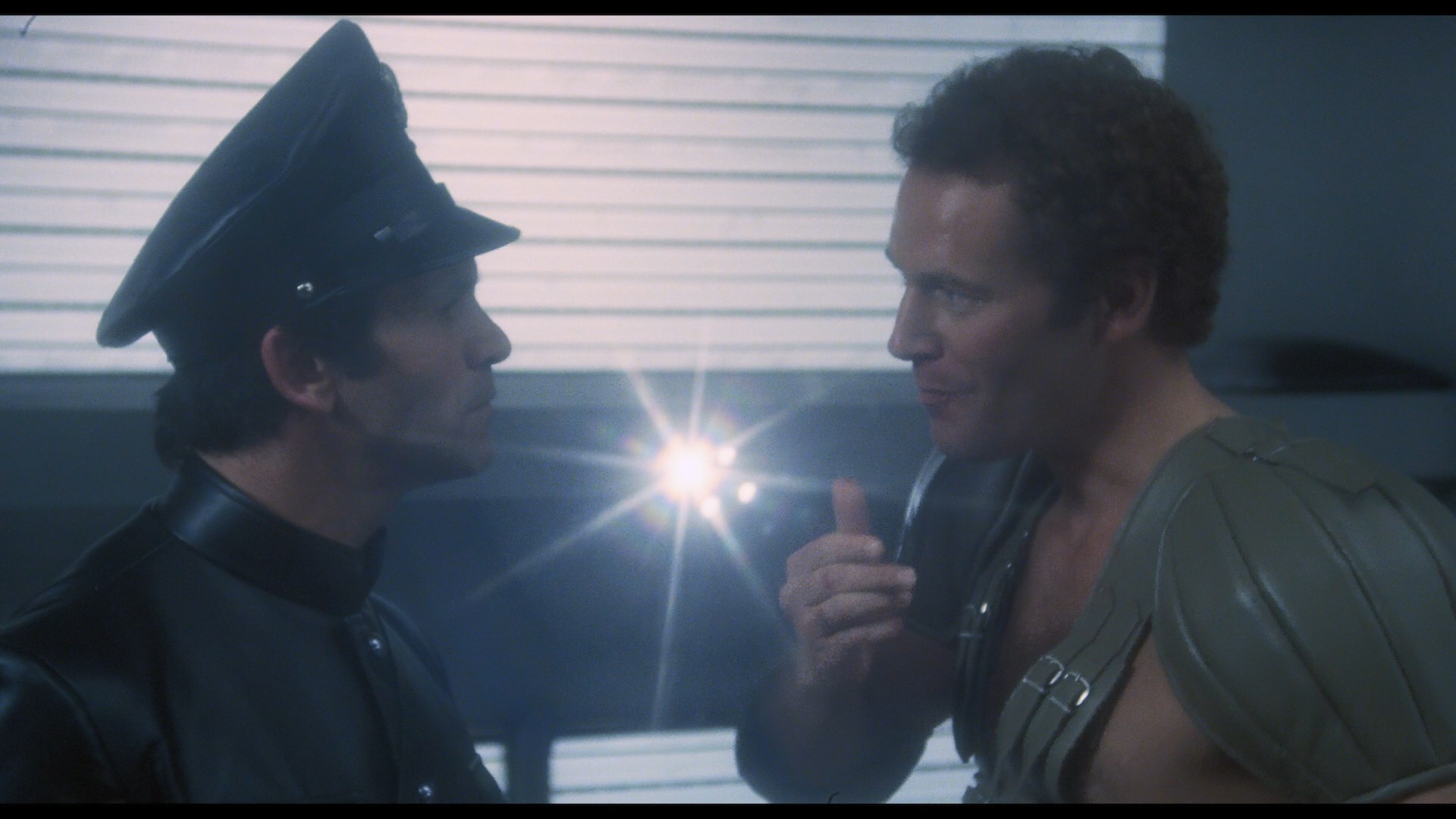 films.
films. 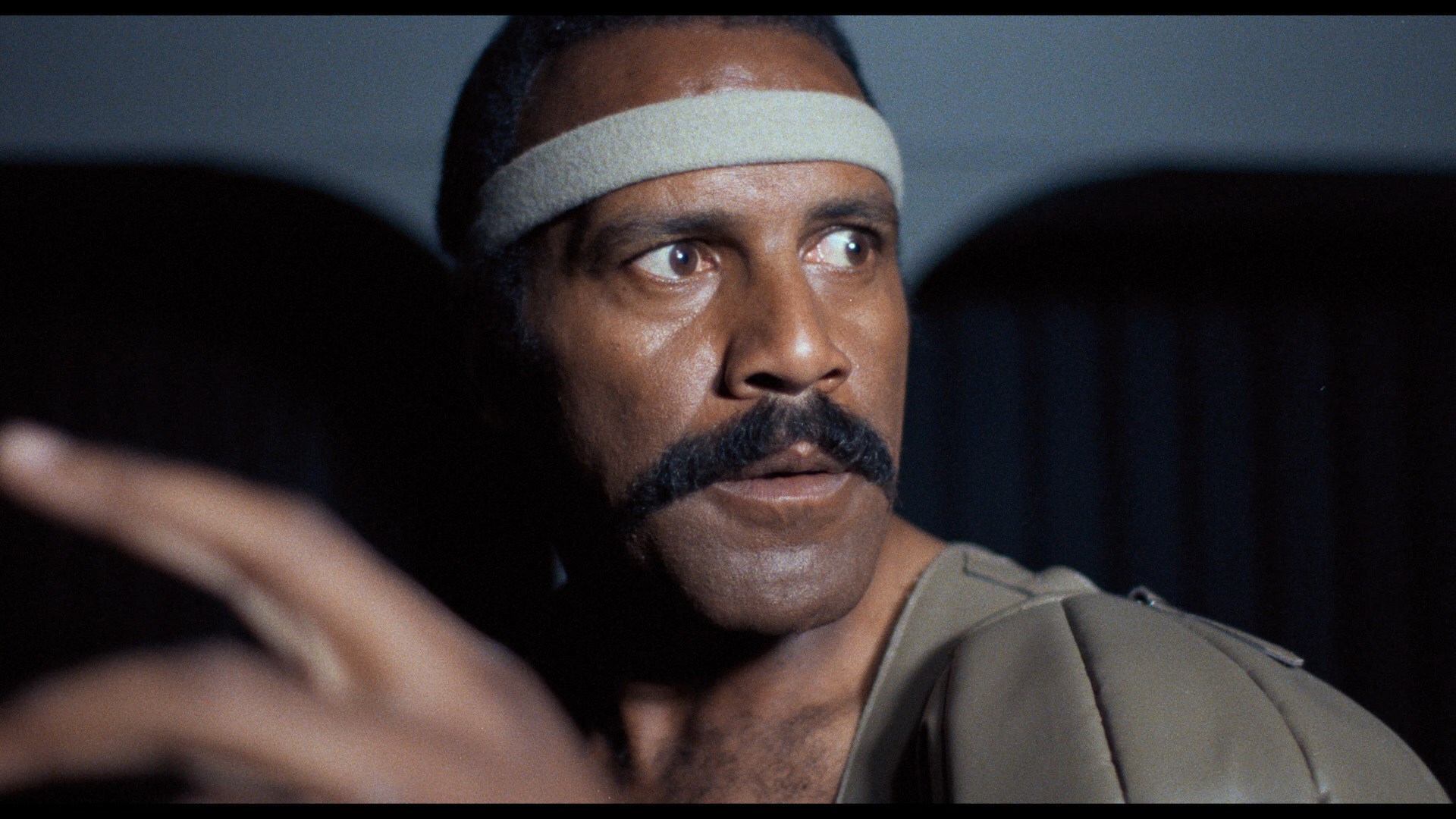 Drake (Aenigma's Martin) is the celebrated star of a hit TV sports show that pits motorcycle-riding contestants against each other, but his stardom hits the skids when he's sent to death row for the murder of his newlywed wife. Rival network head Cortez (Cassinelli, with a really bad haircut) has decided to copy the show format but set it in Rome's Colosseum, with its contestants culled from prison including Drake, Abdul (Williamson), Kirk (Zombie's Cliver), and Akira (Yamanouchi), all tested out by a sadistic warden, Raven (New York Ripper's Ross). Network assistant Sarah (Brigliadori) is impressed with Drake's mettle and becomes involved in a plan to not only help the men fight their captive state but discover the sinister truth about the puppet master behind the violent competition awaiting them.
Drake (Aenigma's Martin) is the celebrated star of a hit TV sports show that pits motorcycle-riding contestants against each other, but his stardom hits the skids when he's sent to death row for the murder of his newlywed wife. Rival network head Cortez (Cassinelli, with a really bad haircut) has decided to copy the show format but set it in Rome's Colosseum, with its contestants culled from prison including Drake, Abdul (Williamson), Kirk (Zombie's Cliver), and Akira (Yamanouchi), all tested out by a sadistic warden, Raven (New York Ripper's Ross). Network assistant Sarah (Brigliadori) is impressed with Drake's mettle and becomes involved in a plan to not only help the men fight their captive state but discover the sinister truth about the puppet master behind the violent competition awaiting them.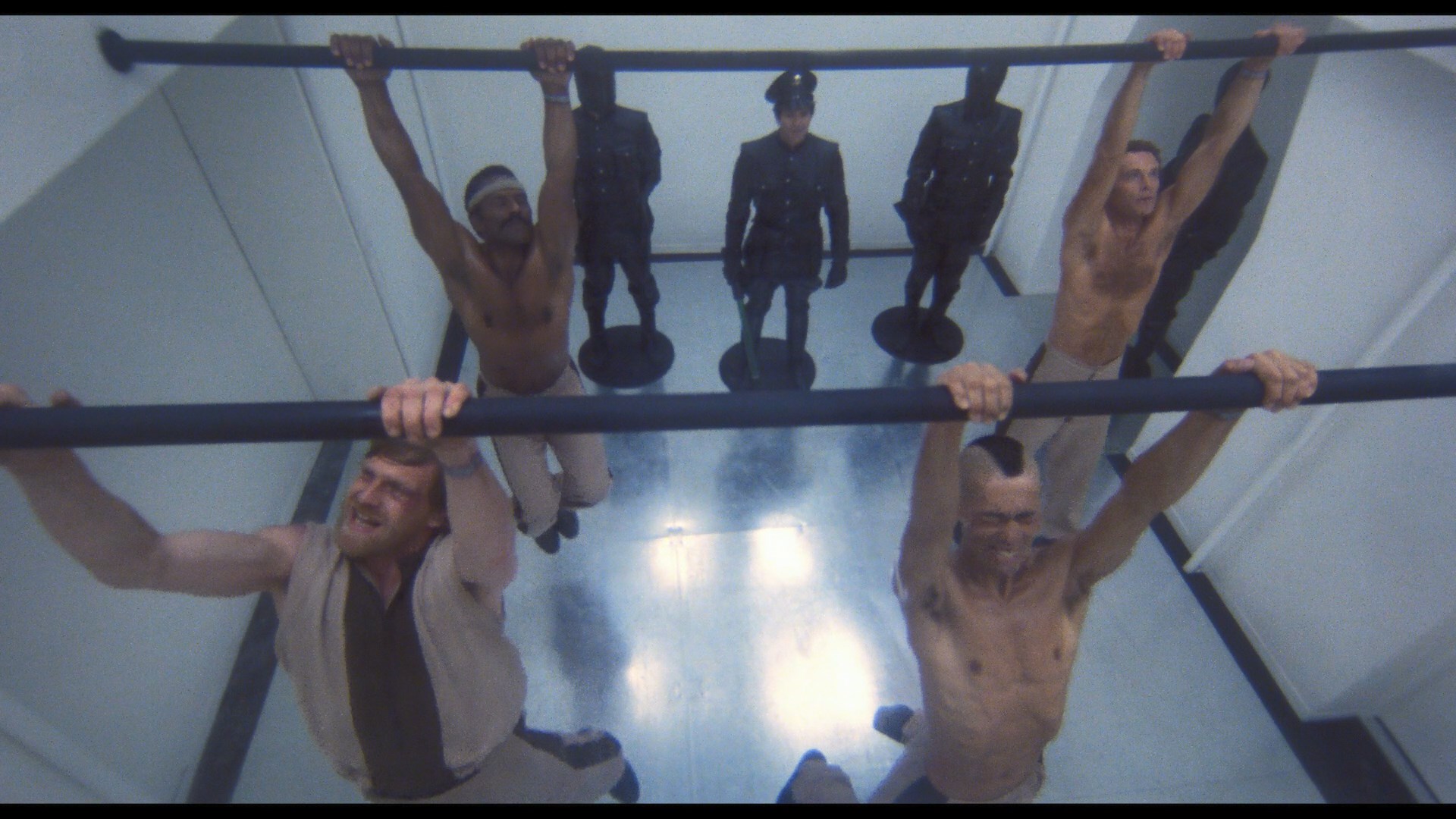 should've swapped roles). It's always great to see familiar Fulci
should've swapped roles). It's always great to see familiar Fulci 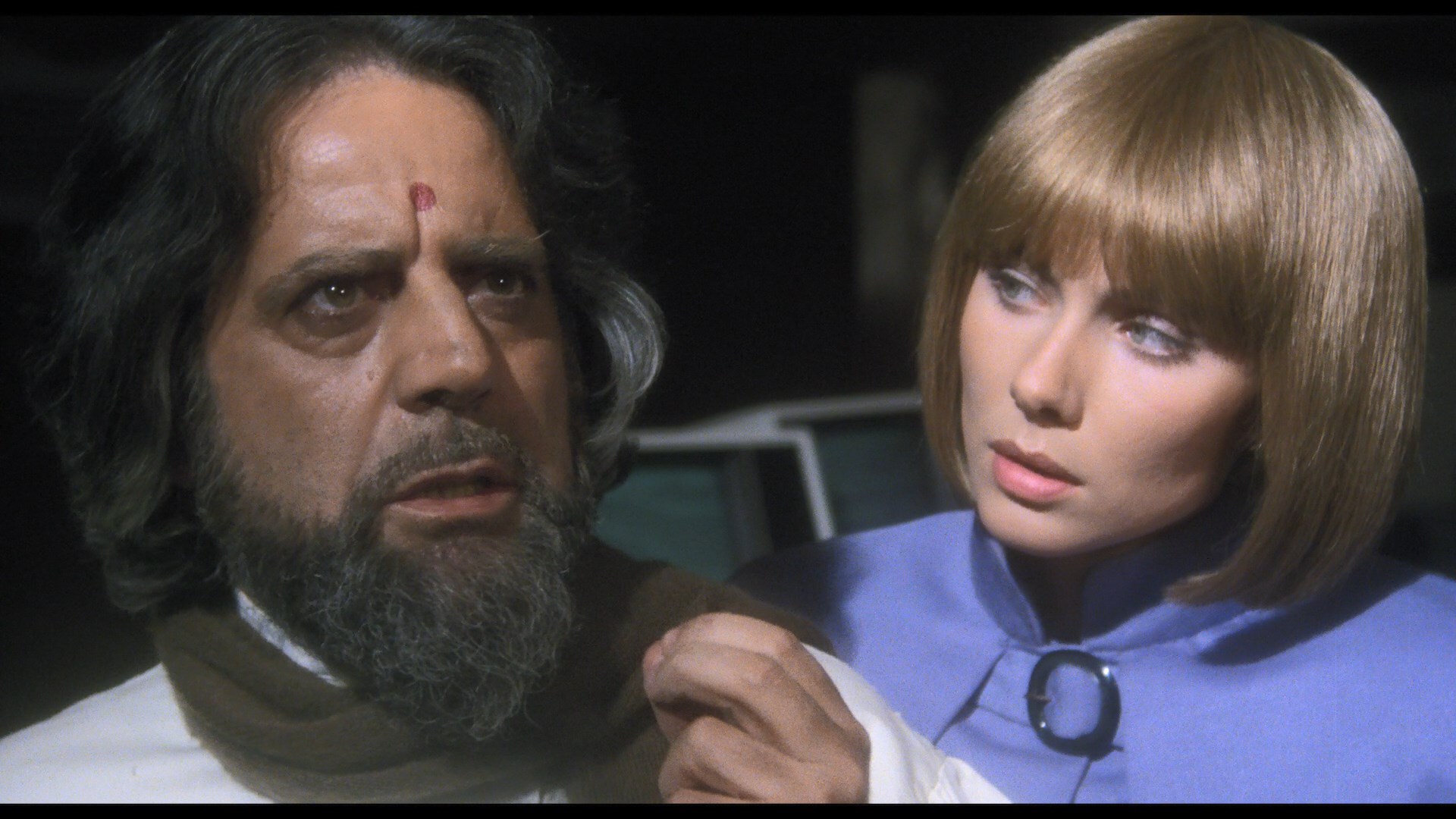 faces turning up like Cliver and Manhattan Baby's Cosimo Cinieri, plus an uncredited but very vivid bit for The Beyond's Cinzia Monreale on a gory Poe-inspired game show. There's also an infectious fanfare-heavy score by Riz Ortolani, his third and final for Fulci after their giallo glory days with Perversion Story and Don't Torture a Duckling. Though bearing a 1983 copyright, the film opened in 1984 ahead of Fulci's last bona fide giallo, Murderock; unfortunately, health issues would sideline him after that until he made a belated comeback two years later.
faces turning up like Cliver and Manhattan Baby's Cosimo Cinieri, plus an uncredited but very vivid bit for The Beyond's Cinzia Monreale on a gory Poe-inspired game show. There's also an infectious fanfare-heavy score by Riz Ortolani, his third and final for Fulci after their giallo glory days with Perversion Story and Don't Torture a Duckling. Though bearing a 1983 copyright, the film opened in 1984 ahead of Fulci's last bona fide giallo, Murderock; unfortunately, health issues would sideline him after that until he made a belated comeback two years later. 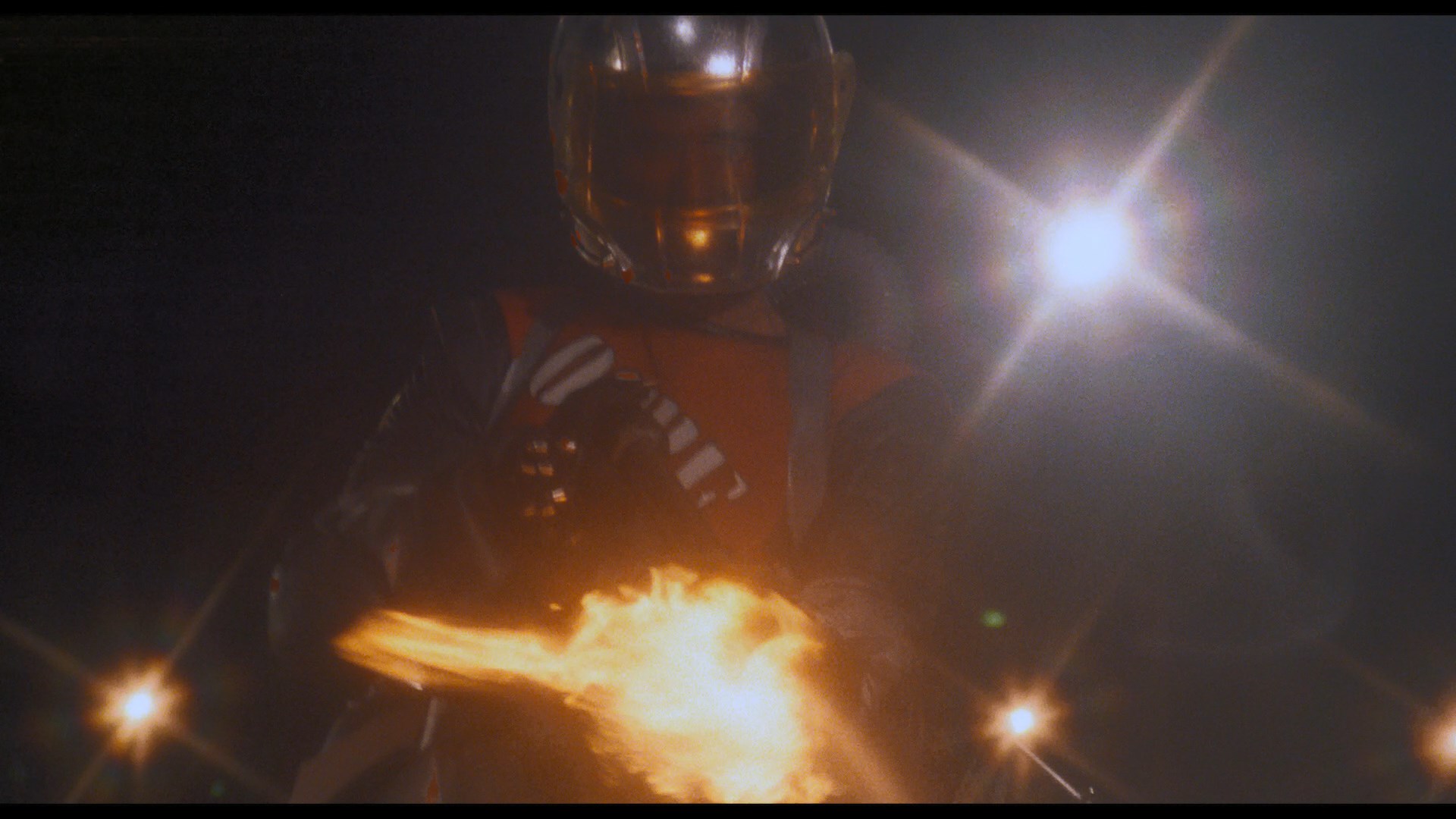 In 2021, Severin Films added this one to its roster of Fulci releases on Blu-ray with a much-needed
In 2021, Severin Films added this one to its roster of Fulci releases on Blu-ray with a much-needed 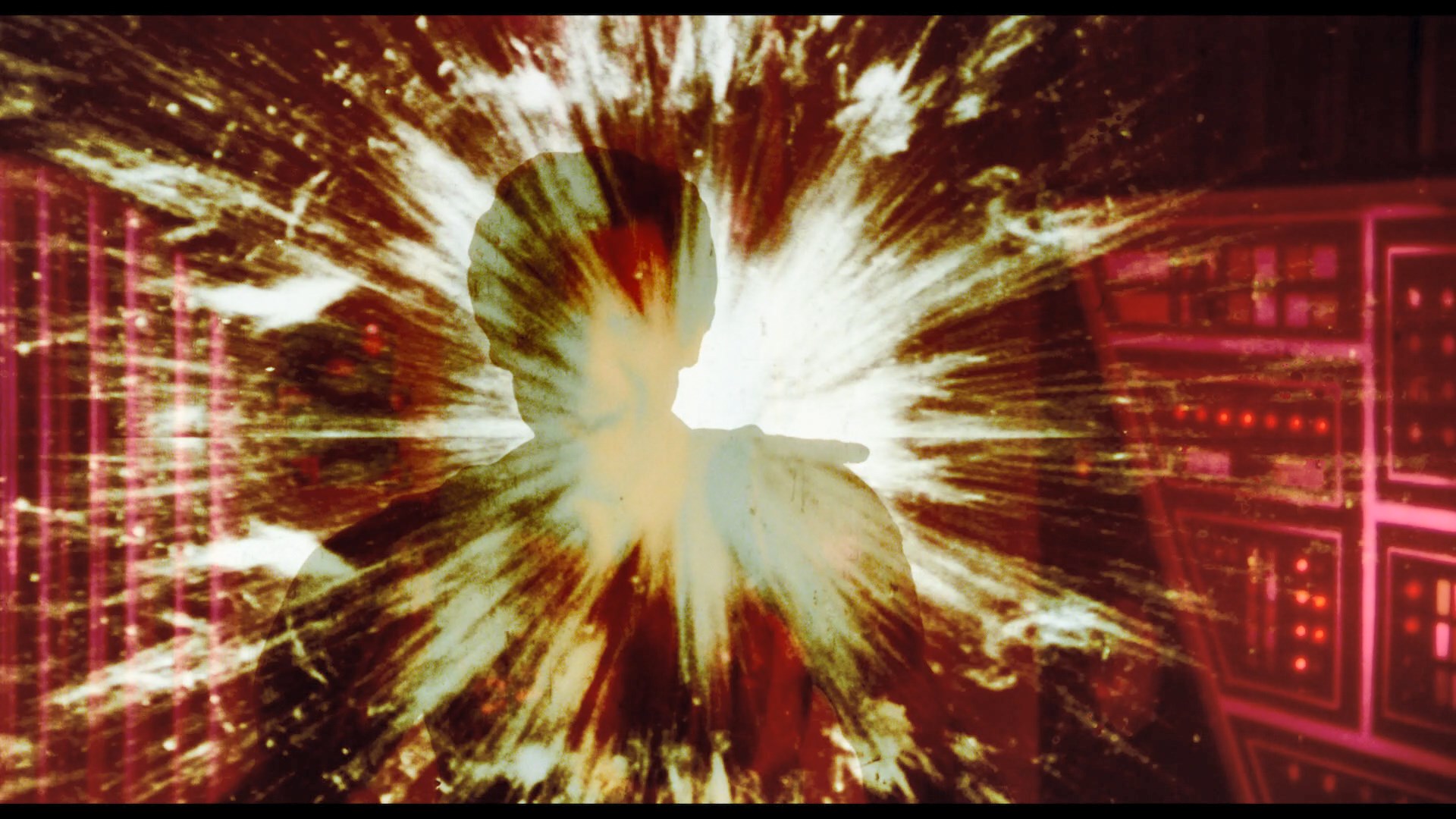 upgrade courtesy of a 4K scan of an interpositive. Needless to say, this release (under the title Warriors of the Year 2072) is a going to be a revelation for just about anyone since there was no way to see this in good quality before apart from a very scarce theatrical print from Europe. The dark scenes finally have depth and clarity, the golds really pop, and it all looks much more like the Fulci style we know and love. The film was shot in English (with looping for some of the secondary actors(, so that's the version you get here with a good DTS-HD MA English 2.0 track (with optional English SDH subtitles). This also represents the longer 94-minute European cut of the film, which has only been easily accessible before via the Italian-only DVD release and contains some extra plot and character bits involving Drake; you can read a full breakdown of the differences here. A commentary is also included with this writer and Troy Howarth, so that can't be evaluated here but hopefully it will prove to be enjoyable. (The film is also preceded with a warning about strobing lights, and they ain't kidding; Williamson's big intro can give you a migraine.)
upgrade courtesy of a 4K scan of an interpositive. Needless to say, this release (under the title Warriors of the Year 2072) is a going to be a revelation for just about anyone since there was no way to see this in good quality before apart from a very scarce theatrical print from Europe. The dark scenes finally have depth and clarity, the golds really pop, and it all looks much more like the Fulci style we know and love. The film was shot in English (with looping for some of the secondary actors(, so that's the version you get here with a good DTS-HD MA English 2.0 track (with optional English SDH subtitles). This also represents the longer 94-minute European cut of the film, which has only been easily accessible before via the Italian-only DVD release and contains some extra plot and character bits involving Drake; you can read a full breakdown of the differences here. A commentary is also included with this writer and Troy Howarth, so that can't be evaluated here but hopefully it will prove to be enjoyable. (The film is also preceded with a warning about strobing lights, and they ain't kidding; Williamson's big intro can give you a migraine.) 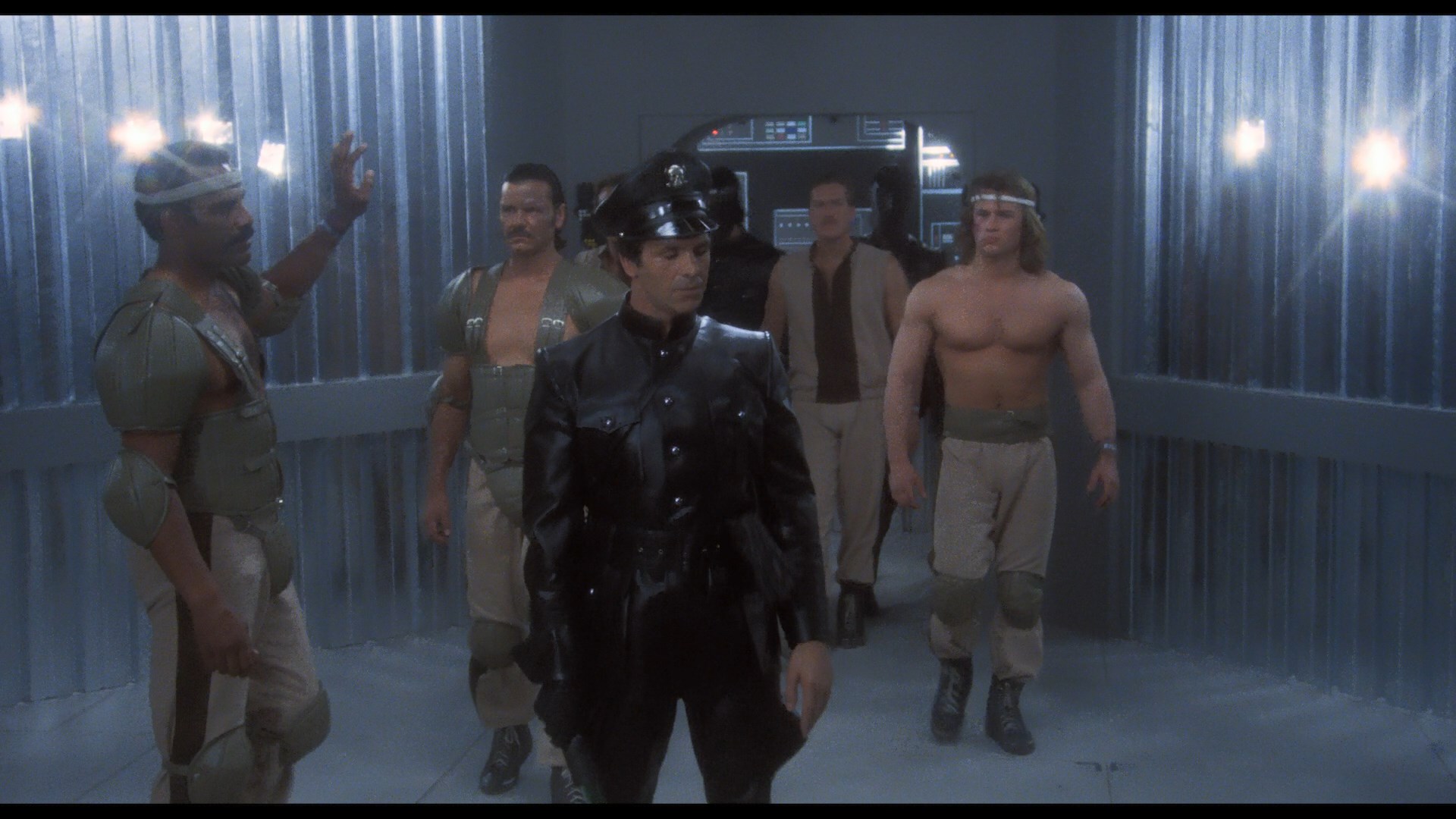 screenwriter Dardano Sacchetti chats about the origins of the film several years earlier and the aborted attempt to get it off the ground earlier with the Amatis, the increasing challenges of making films in Italy at that time (dovetailing with the weird creation of Blastfighter), and his dissatisfaction with the "whodunit" angle imposed on the film along the way.
screenwriter Dardano Sacchetti chats about the origins of the film several years earlier and the aborted attempt to get it off the ground earlier with the Amatis, the increasing challenges of making films in Italy at that time (dovetailing with the weird creation of Blastfighter), and his dissatisfaction with the "whodunit" angle imposed on the film along the way. 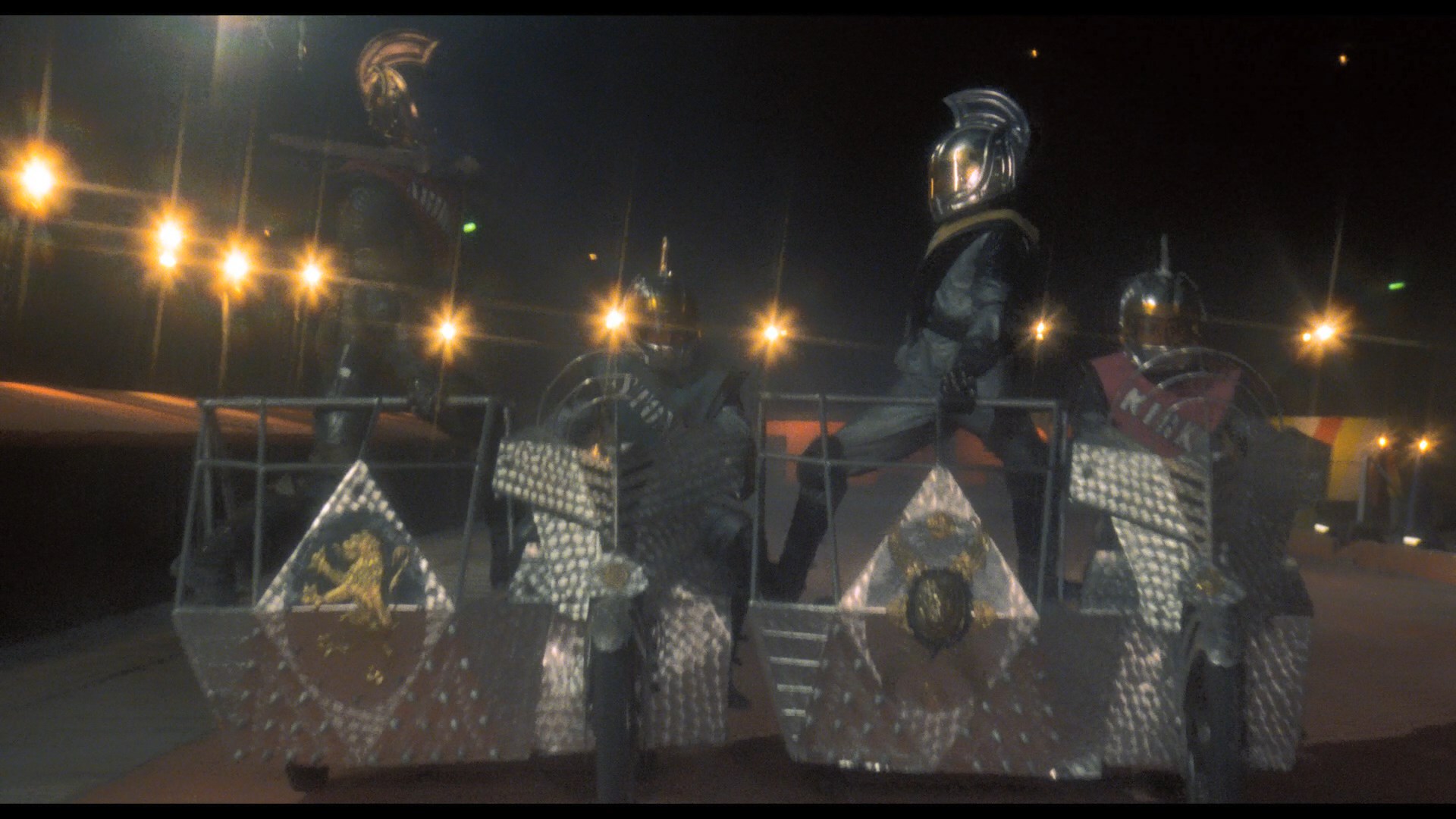 Then Ross appears in "The Nicest Villain" (17m49s) to cover his entire working career with Fulci from their first meeting, his casting in Ripper, and his fondness for this film and his militaristic character as well as his good rapport with Martin, Williamson, and Cassinelli (and the terrible experience with the "mean" Brigliadori). Cliver appears next in the "The Good-Hearted Gladiator" (12m15s), chronicling his move to acting after being discovered on the street, going into some prestigious Italian films (and some less so), and embarking on a cinematic adventure with Fulci through several films including this one. In "My Father, the Hero" (19m19s), Antonella Fulci shares her memories of her dad's personality, his greater comfort being on a movie set versus being at home, his mercurial moods, and the cult reputation he enjoys today. "Photographing the Future" (17m11s) features cinematographer Giuseppe Pinori noting how he had apparently impressed Fulci with a mineral water ad he'd shot and being brought on to both this film and Murderock, which share some obvious visual similarities (including those strobe lights!). Finally "Four Times Lucio" (7m58s) has Monreale covering her quartet of Fulci projects with roles of drastically different sizes and her own positive experiences with his "irascible" personality. Finally an English trailer is included under that Rome 2072 A.D. The New Gladiators title, and you also get a bonus CD featuring the entire Ortolani soundtrack with contents identical to the recent Beat Records disc. The release is also available as part of The Marauders Bundle and The Nuclear Meltodwn Bundle.
Then Ross appears in "The Nicest Villain" (17m49s) to cover his entire working career with Fulci from their first meeting, his casting in Ripper, and his fondness for this film and his militaristic character as well as his good rapport with Martin, Williamson, and Cassinelli (and the terrible experience with the "mean" Brigliadori). Cliver appears next in the "The Good-Hearted Gladiator" (12m15s), chronicling his move to acting after being discovered on the street, going into some prestigious Italian films (and some less so), and embarking on a cinematic adventure with Fulci through several films including this one. In "My Father, the Hero" (19m19s), Antonella Fulci shares her memories of her dad's personality, his greater comfort being on a movie set versus being at home, his mercurial moods, and the cult reputation he enjoys today. "Photographing the Future" (17m11s) features cinematographer Giuseppe Pinori noting how he had apparently impressed Fulci with a mineral water ad he'd shot and being brought on to both this film and Murderock, which share some obvious visual similarities (including those strobe lights!). Finally "Four Times Lucio" (7m58s) has Monreale covering her quartet of Fulci projects with roles of drastically different sizes and her own positive experiences with his "irascible" personality. Finally an English trailer is included under that Rome 2072 A.D. The New Gladiators title, and you also get a bonus CD featuring the entire Ortolani soundtrack with contents identical to the recent Beat Records disc. The release is also available as part of The Marauders Bundle and The Nuclear Meltodwn Bundle. ![]()